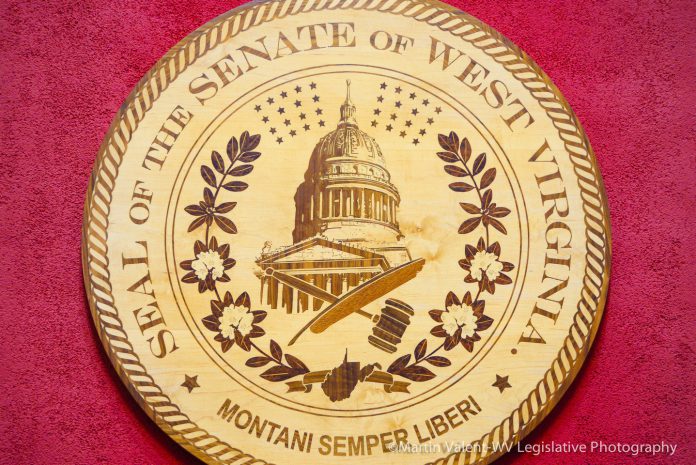As of 4 p.m., Wednesday February 13, the 36th day of the 78th Legislature, 662 bills have been introduced in the Senate. Of these, a total of 5 have passed this week and will go to the House for its consideration. The bills that have passed this week include:
Senate Bill 242 would allow drivers who have less than 14 points on their licenses and complete a defensive drinking course to deduct three points from their license.
Senate Bill 298 would expand the definitions of imminent danger and the physical well being of a child in regards to child abuse. This bill would add parents or guardians who habitually abuse drugs and alcohol to a list of situations that endanger a child’s welfare.
Senate Bill 481 would authorize physician assistants with proper mental health certifications to conduct examinations arranged by a community mental health center designated by the Secretary of the Department of Health and Human Resources in regards to a patient’s mental health hygiene.
Senate Bill 512 would change the number of members on the Records Management and Preservation Board for county government entities from nine to 11 members.
Senate Bill 627 would specify any terrorist threat as a felony regardless of whether a person actually intended to commit a terrorist act.
A Sampling of Bills Introduced In the Senate
Senate Bill 588 would forbid soil or waste earth and rock covering a mineral deposit to be placed permanently in or within 100 feet of any stream. This would not apply to the placement of coal processing waste.
Senate Bill 589 would require towing services, their vehicles and operators to be subject to Public Safety Commission safety rules. Towing businesses would also be required to record the starting and ending time; the rate charged to each customer; the name, trade name, address and telephone number of the towing service; the name and address of the owner of the towed vehicle; and the vehicle information on each invoice.
Senate Bill 592 would provide a one-time supplement of 4 percent of a person’s monthly annuity benefit for annuitants within the Deputy Sheriff Retirement System who have been retired three to five consecutive years. In the event of an annuitant’s death, surviving beneficiaries considered eligible based on the retirement date of the deceased may claim the supplement.
Senate Bill 595 would establish goals and objectives for public and higher education in 2020 titled Vision 2020. This bill would clarify elements of the accountability system for public higher education and create a committee to study capital projects and maintenance needs of buildings involved with higher education.
Senate Bill 608 would add sexual orientation to the categories covered by the Human Rights Act. Age and sexual orientation would also be added to categories protected by the Fair Housing Act.
Senate Bill 609 would allow for the creation of the West Virginia Innovation and Development Act. It would allow the Economic Development Authority (WVEDA) to give $2 million dollars annually to invest in seed and venture capital and other equity investments to provide support to entrepreneurs. Also, the WVEDA would be allowed to award another $5 million dollars in credits annually for investments in qualified investment companies.
Senate Bill 610 would allow schools to be open on Saturday and remove the provision stating that special classes held on Saturdays must be voluntary.
Senate Bill 612 would increase the number of people on the West Virginia Racing Commission from three to five and require that less than four members be of the same political party. This bill would also require that one member be from the West Virginia Greyhound Owners and Breeders Association and another member be a representative of the National Horsemen’s Benevolence & Protective Association.
Senate Bill 613 would require the design, construction and use of domestic and commercial liquefied petroleum gas-consuming equipment to be certified. This bill would also require all equipment involved in the delivery of liquefied petroleum gas to function according to the instructions designated for that piece of equipment by its manufacturer. Equipment alteration or repair would be prohibited unless completed according to the manufacturer’s prescribed procedures. This bill would also protect persons involved, but not participating, in the act of selling, supplying, handling or transporting liquefied petroleum gas from civil liability.
Senate Bill 615 would allow a licensed optometrist to prescribe vision correction devices that also dispense drugs that would ordinarily be applied externally to the eye or taken orally.
Senate Bill 625 would authorize the State Board of Education to set amounts for and collect review fees from publishers wishing to have their instructional and educational materials adopted for use in West Virginia.
Senate Bill 631 would include antique and classic trucks in the classification of antique and classic motor vehicles.
Senate Bill 632 would encourage restaurants to provide nutritional information on their menus, including signboards that drive-through customers order from. Participating restaurants would be given permission to display a universal logo that would reflect the availability of caloric information.
Senate Bill 637 would require the West Virginia State Board of Education to develop a CPR and First Aid curriculum that would be taught in the required health courses of all secondary schools.
Senate Bill 645 would exempt city and county hospitals from the requirement to file or publish reports, which is an audit requirement for local government offices.
Senate Bill 647 would give sheriffs and their designees the right to view the information contained in the State Board of Pharmacy’s database, which contains privileged information regarding patient health records.
Senate Bill 656 would allow persons to obtain a single license for hunting, fishing and trapping as of July 1, 2010. This bill would also require that the West Virginia Department of Natural Resources receive 1 percent of the General Revenue Fund each year.

